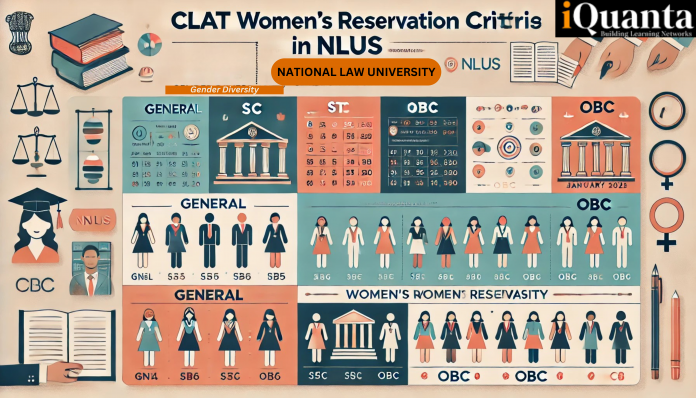India’s National Law Universities (NLUs) are prestigious establishments devoted to legal study and instruction. A number of NLUs have put in place reservation criteria for women in an effort to encourage gender diversity and inclusivity. Usually horizontal in nature, the NLU reservation span multiple categories, including General, Scheduled Castes (SC), Scheduled Tribes (ST), and Other Backward Classes (OBC). An up-to-date and thorough summary of NLUs’ women reservation policy as of January 2025 has been provided here:

Understanding Horizontal Reservations in NLUs
All vertical categories are subject to horizontal reservations. For example, if an NLU sets aside 30% of its seats for female students, this percentage is shared by General, SC, ST, and OBC students. This guarantees that the reservation strategy benefits women from all socioeconomic groups.
Women Reservation Policies in NLUs
NLU Delhi Reservation Policy
Reservation Percentage: 30% horizontal reservation for women candidates.
Details: This reservation applies across all categories, including reserved and foreign national categories. If seats reserved for Persons with Disabilities (PwD) remain unfilled, they are offered to candidates from the respective category from which horizontal reservation has been provided.
NALSAR Hyderabad Reservation Policy
Reservation Percentage: 33.33% horizontal reservation for women candidates.
Details: This reservation is specifically for candidates from Andhra Pradesh. Additionally, there is a 0.5% horizontal reservation for eminent sports persons from Andhra Pradesh.
NLSIU Bangalore Reservation Policy
Reservation Percentage: 33% horizontal reservation for women candidates.
Details: This reservation is part of the special reservation categories and applies across all vertical categories. It’s important to note that special reservations for women are provided within the social reservation for each category.
NLU Jodhpur Reservation Criteria
Reservation Percentage: 30% horizontal reservation for women candidates.
Details: This reservation applies across all categories, excluding NRI/NRI sponsored and supernumerary quotas. Additionally, 5% of seats are horizontally reserved for Persons with Disabilities (PwD).
DSNLU Visakhapatnam Reservation Policy
Reservation Percentage: 33.33% horizontal reservation for women candidates.
Details: This reservation is specifically for candidates from Andhra Pradesh. There is also a 5% reservation for candidates from the Economically Weaker Section (EWS).
NUSRL Ranchi Reservation Policy
Reservation Percentage: 30% horizontal reservation for women candidates.
Details: This reservation applies across all categories, ensuring that women from diverse backgrounds have equitable access to legal education.
Impact of Women’s Reservation in NLUs
Female enrolment at NLUs has significantly increased as a result of the establishment of women’s reservation policy. For example, new data shows that more women are signing up to take the Common Law Admission Test (CLAT), which suggests that more women are interested in studying law. Additionally, by encouraging a more equitable gender ratio in the classroom, these reservations have enhanced the academic environment and promoted a diversity of viewpoints. Furthermore, it is anticipated that greater female representation in NLUs will support gender equality in the legal profession over the long run.
| Year | Total CLAT Registrations | Female Registrations | Percentage Increase |
| 2023 | 60,000 | 20,000 | 10% |
| 2024 | 65,000 | 23,500 | 17.5% |
| 2025 | 70,000 | 28,000 | 19% |
NLU Reservation Policy for Women
| NLU Name | Reservation Percentage | Applicable Categories | Additional Notes |
| National Law University, Delhi (NLUD) | 30% | All categories, including reserved | Also applies to foreign national categories |
| National Academy of Legal Studies and Research (NALSAR), Hyderabad | 33.33% | Andhra Pradesh candidates | 0.5% reservation for eminent sports persons |
| National Law School of India University (NLSIU), Bangalore | 33% | All categories | Special reservation within social reservation for each category |
| National Law University, Jodhpur (NLUJ) | 30% | All categories except NRI/supernumerary | 5% horizontally reserved for PwD |
| Damodaram Sanjivayya National Law University (DSNLU), Visakhapatnam | 33.33% | Andhra Pradesh candidates | 5% reservation for Economically Weaker Section (EWS) |
| National University of Study and Research in Law (NUSRL), Ranchi | 30% | All categories | Ensures equitable access across diverse backgrounds |
Additionally, by encouraging a more equitable gender ratio in the classroom, these reservations have enhanced the academic environment and promoted a diversity of viewpoints. Furthermore, it is anticipated that greater female representation in NLUs will support gender equality in the legal profession over the long run.
NLU Rervation Critera – Challenges and Criticisms
Despite being a progressive move, the implementation of women’s reservations in NLUs has not been without difficulties:
| Challenge | Description |
| Implementation Issues | Ensuring uniform application of reservation policies across categories can be complex |
| Exclusion of Certain Categories | Some reservations do not extend to NRI/supernumerary quotas, limiting opportunities for these groups |
| Need for Comprehensive Support | Additional support mechanisms such as scholarships and mentorship are required for holistic success |

Conclusion:
One important step towards attaining gender parity in Indian legal education is the National Law Universities’ reservation policies for women. These organisations are laying the groundwork for a more inclusive legal profession by offering fair chances. To overcome obstacles and guarantee that the goals of diversity and inclusivity are completely achieved, these policies must be continuously assessed and improved.
NLUs must not only uphold but further strengthen their commitment to gender diversity as cultural perceptions change and more women seek careers in the legal industry. This entails broadening the scope of reservation procedures, offering strong support networks, and cultivating an atmosphere in which all students—male or female—can succeed.
In conclusion, while significant progress has been made, the journey towards complete gender equality in legal education is ongoing. The experiences and outcomes of women’s reservation policies in NLUs will continue to shape the future of legal education in India.

